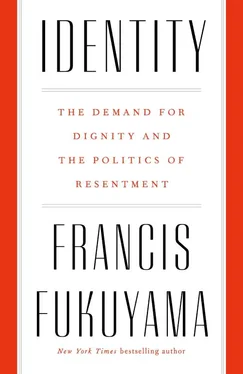The global weakness of the left is in many ways a surprising outcome, given the rise of global inequality over the past three decades. By global inequality, I am referring to the rise of inequality within individual countries, rather than between countries. The gap between rich and poor countries has closed as high levels of growth have occurred not just in East Asia but in Latin America and sub-Saharan Africa. But as the economist Thomas Piketty has shown, within-country inequality around the world has seen a large increase since 1980; contrary to the long-accepted theory of the economist Simon Kuznets, rich-country incomes have been diverging rather than converging. {2} 2 Thomas Piketty, Capital in the Twenty-First Century (Cambridge, MA: Belknap Press, 2014), 20–25, 170–87.
Hardly a single region of the world has not seen the rise of a new class of oligarchs—billionaires who use their wealth politically to protect their family interests. {3} 3 The number of bi-billionaires, that is, individuals with wealth of $2 billion in 2013 dollars, increased fivefold from 1987 to 2013; their combined wealth is more than all of Africa’s. Milanovic, Global Inequality , 41–45.
The economist Branko Milanovic has devised a widely cited “elephant graph,” which shows the relative gains in per capita income for different segments of the global income distribution. The world grew much richer through productivity gains and globalization from 1988 to 2008, but these gains were not equally distributed. Those in the twentieth to the seventieth percentiles had substantial increases in income, with even larger ones for those in the ninety-fifth percentile. But the part of the global population around the eightieth percentile experienced either stagnation or else marginal gains. This group largely corresponds to the working class in developed countries—that is, people with a high school education or less. While they remain much better off than those below them, they have lost significant ground to people in the top 10 percent of the distribution. Their relative status, in other words, fell sharply.
TABLE 1
Relative Gain in Real Per Capita Income by Global Income Level, 1988–2008 {4} 4 Ibid., 11.

Within the developed world, inequality has been the most pronounced in Britain and the United States, the two countries that led the “neoliberal,” pro–free market revolution of the 1980s under Margaret Thatcher and Ronald Reagan. In the United States, the strong economic growth of the 1980s and ’90s was not evenly distributed, but went overwhelmingly to those with good educations. The old American working class, which thought of itself as the core of the middle class, steadily lost ground. According to a study by the International Monetary Fund, in a hollowing out of the middle class, individuals earning from 50 to 150 percent of median income fell from 58 to 47 percent of the population from 2000 to 2014. Only one-quarter of 1 percent did this by moving up into higher income brackets; an astonishing 3.25 percent moved down the income ladder. {5} 5 Alichi, Kantenga, and Solé, “Income Polarization,” 5.
This inequality was intensified by the financial crisis of 2008, in which the machinations and policy choices of the financial sector created an asset bubble whose bursting destroyed jobs and savings for millions of ordinary Americans, as well as countless others around the world.
Under these circumstances, one would expect to see a huge revival of a populist left in those countries experiencing the highest levels of inequality. Since the French Revolution, the left has defined itself as the party of economic equality, willing to use state power to redistribute wealth from rich to poor. Yet the aftermath of the global financial crisis has seen something of the opposite, a rise of right-wing populist nationalist forces across many parts of the developed world. This was nowhere more true than in the United States and Britain, where deindustrialization had ravaged the old working class. In the former, the financial crisis spawned the left-wing Occupy Wall Street movement and the right-wing Tea Party. The former marched and demonstrated, then fizzled out, while the latter succeeded in taking over both the Republican Party and much of Congress. In 2016, voters failed to endorse the most left-wing populist candidates, choosing nationalist politicians instead.
How do we explain the failure of the left to capitalize on rising global inequality, and the rise of the nationalist right in its place? This is not a new phenomenon: parties of the left have been losing out to nationalists for well over a hundred years, precisely among those poor or working-class constituencies that should have been their most solid base of support. The European working class lined up not under the banner of the Socialist International in 1914, but with their national governments as World War I began. This failure has befuddled Marxists for years; in the words of Ernest Gellner, they told themselves that
just as extreme Shi’ite Muslims hold that Archangel Gabriel made a mistake, delivering the Message to Mohamed when it was intended for Ali, so Marxists basically like to think that the spirit of history or human consciousness made a terrible boob. The awakening message was intended for classes , but by some terrible postal error was delivered to nations . {6} 6 Gellner, Nations and Nationalism , 124.
Similarly, in the contemporary Middle East, a letter addressed to classes has been delivered instead to religions.
This postal delivery error occurred because of the way in which economic motivations are intertwined with identity issues in human behavior. To be poor is to be invisible to your fellow human beings, and the indignity of invisibility is often worse than the lack of resources.
Economists assume that human beings are motivated by what they label “preferences” or “utilities,” desires for material resources or goods. But they forget about thymos, the part of the soul that desires recognition by others, either as isothymia, recognition as equal in dignity to others, or megalothymia, recognition as superior. A great deal of what we conventionally take to be economic motivation driven by material needs or desires is in fact a thymotic desire for recognition of one’s dignity or status.
Take the issue of equal pay for equal work, something that has been at the core of the women’s rights movement for decades. While women have made huge gains over the past fifty years in the labor force, considerable attention has been paid to the glass ceilings that have kept women out of senior management positions or, more recently, from the upper ranks of tech firms in Silicon Valley. Much of the agenda of modern feminism has been set not by working-class women hoping to get jobs as firefighters or Marine grunts, but by educated professional women seeking to rise closer to the top of the social hierarchy.
Among this group, what is the real motive driving demands for equal pay? It is not economic in any conventional sense. A female lawyer who is passed over for partner or is made vice president but at a salary 10 percent lower than that of her male counterparts is in no sense economically deprived: she is likely to be in the very top of the national income distribution and faces little economic deprivation. If she and her male counterpart were paid twice their relative salaries, the problem would still remain.
Rather, the anger felt in such situations is not so much about resources as about justice: the pay she is awarded by the firm is important not so much because it provides needed resources, but rather because salary is a marker of dignity, and the firm is telling her that she is worth less than a man even though her qualifications and contributions are equal or even superior. Salary is a matter of recognition . She would feel equally aggrieved if she was given the same pay, but told that she would never hold a coveted title simply because she is a woman.
Читать дальше













